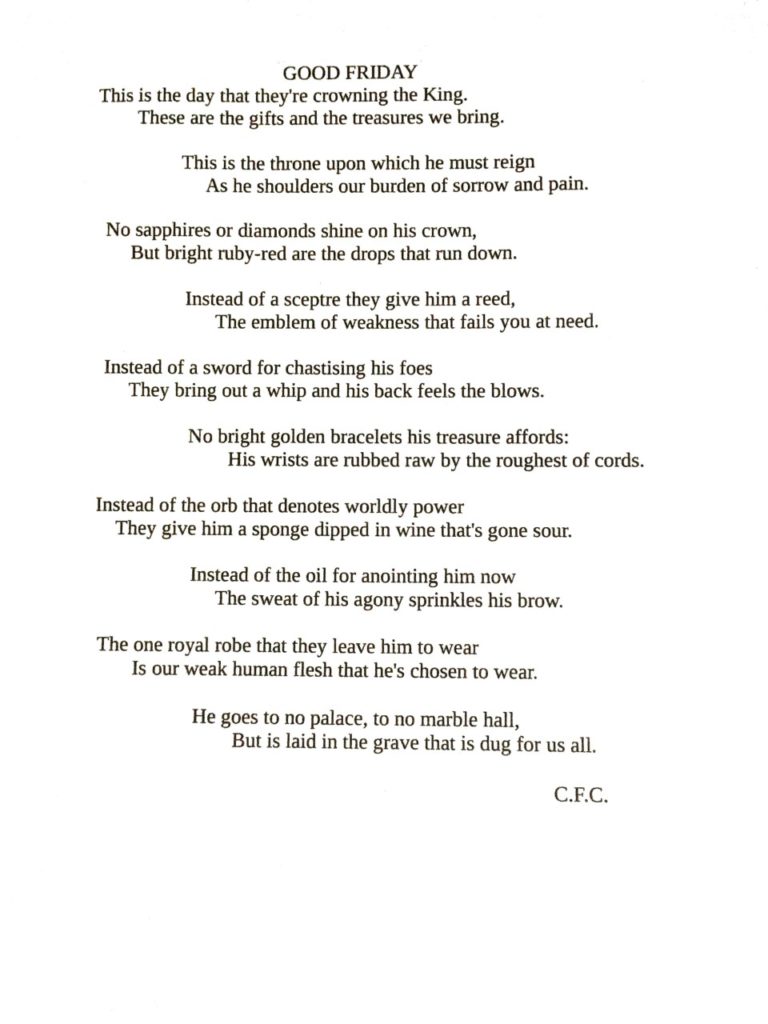Christ the King
“The King will reply, ‘I tell you the truth, whatever you did for one of the least of these…. you did for me.’ “ Jesus, in Matthew 25:31-46, NIV.
“Shakespeare wrote about Richard III, Henry IV and Henry V. But…. those kings were all safely dead when Shakespeare wrote about them.” Andrew Roberts, historian.
Today celebrates Christ the King, which happens amidst great controversy over the accuracy of the latest Netflix series about the current British Royal Family, The Crown, and the alleged subterfuge to gain the interview given to the BBC by Diana, Princess of Wales. Many people remember the Wales’ marriage and divorce which, with other issues, began to undermine the monarchy itself and the enquiry into how the interview with her was obtained may help to establish some of the truth about what happened. However, creating fiction such as a critical letter written by Lord Mountbatten to Prince Charles in a programme about real events has further distorted an already very complex situation, the resonances of which are still ongoing 25 years after Diana’s death. In The Crown, there were more than 500 factual errors in Series One alone but, as it portrays real people, some viewers may believe what is screened although the producers have already said that it’s not intended to be a documentary. These aspects of worldly rule have caused great controversy and all this, the ongoing challenges of the pandemic as Christmas approaches and the many other issues currently the focus of criticism and speculation in public life mean that truth, often multi-faceted, can be hard to establish and rumour becomes rife.
That was so for Jesus, when appearing before Pontius Pilate who questioned his Kingship and then asked “What is truth?”. That Kingship was mockingly confirmed by the crown of thorns given to him and the statement above the throne of his cross where it was written Jesus of Nazareth, King of the Jews. Yet the reality is that, in Luke’s Gospel, the angel told Mary that “The Lord God will give him the throne of his father David and….his Kingdom will never end” and the Magi in Matthew’s account asked, “Where is the one who has been born King of the Jews?”, upsetting the insecure King Herod in the process. There are many prophecies in the Old Testament about the coming King and David, one of Jesus’ ancestors, was just a shepherd boy before himself becoming a King of profound contradictions.
So, the reference to sheep and goats in today’s Gospel is a powerful one, also with many resonances. Sheep and goats in the time of Jesus looked similar and often grazed together, though they would be separated at night as the goats with thinner coats were not as hardy and would need to be kept warm. The link with David is emphasised when John calls Jesus the Lamb of God, later sacrificed for his flock, and Jesus refers to himself as the Good Shepherd. In today’s parable, he reminds his followers that the sheep and goats will be separated and judged but that this will be done fairly, according to how they have acted towards those around them who are also part of the flock. There may be profound contradictions for us as we hear this and respond to, or ignore, those around us but Jesus reminds us that truth and justice will eventually prevail, no matter how unlikely it may currently seem. And, if earthly rulers or those in authority, much in the news or subject to public debate seem to be as full of profound contradictions as King David, isn’t that true of all of us and the human condition? The good news is that the King of heaven not only knows this but has experienced it – he will truly be a fair judge of us and our actions when our time comes and we know his Kingdom come here on earth as it is in heaven. That is reflected in this poem written by Rev’d Kit Carter for Good Friday but also appropriate for Christ the King.
With my prayers,
Christine
Guardian of the Shrine Church of St Melangell.


